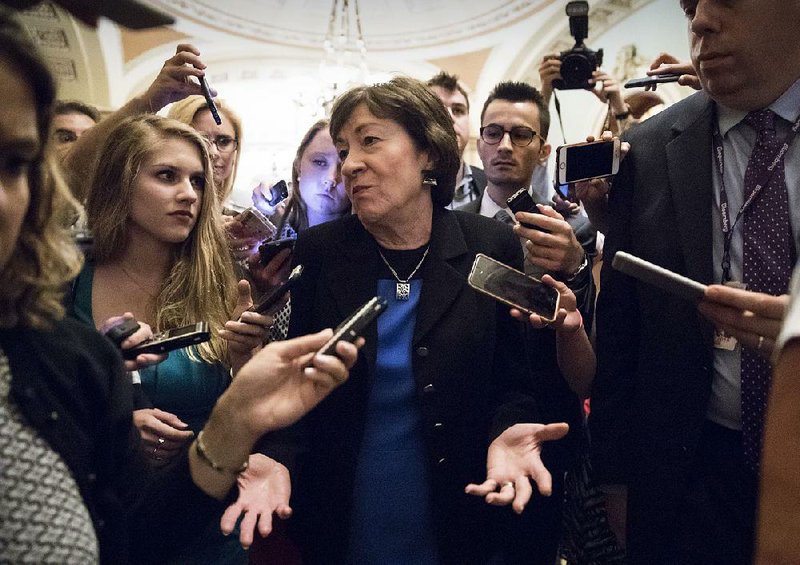WASHINGTON -- Republican leaders unveiled a new health care bill Thursday in their effort to repeal and replace the 2010 Affordable Care Act. They immediately lost two key Senate votes, leaving none to spare as Republicans look to move forward on the bill.
President Donald Trump declared a day earlier that failure would make him "very angry" and that he would blame Senate Majority Leader Mitch McConnell of Kentucky.
But talking with reporters aboard Air Force One en route to France, Trump also acknowledged the challenges lawmakers face.
"I'd say the only thing more difficult than peace between Israel and the Palestinians is health care," Trump said. "But I think we're going to have something that's really good and that people are going to like."
[INTERACTIVE: Compare House, Senate bills with Affordable Care Act]
The reworked bill McConnell presented to fellow Republicans aims to win conservatives' support by letting insurers sell low-cost, skimpy policies. At the same time, the bill seeks to placate hesitant moderates by adding billions to combat opioid abuse and help consumers with skyrocketing insurance costs.
Moderate Sen. Susan Collins of Maine told reporters she had informed McConnell she would be voting against beginning debate on the bill, citing in part cuts in the Medicaid health program for the poor and disabled. Sen. Rand Paul of Kentucky, who has repeatedly complained that McConnell's efforts don't amount to a full-blown repeal of the Affordable Care Act, also announced he was a "no."
That means McConnell cannot lose any other Republican senators' votes. With Democrats unanimously opposed in a Senate split 52-48 in favor of the GOP, he needs 50 votes, with Vice President Mike Pence breaking the tie, to get past a procedural hurdle and begin debate on the bill.
The showdown vote is set for next week, though McConnell could cancel again if he's short of support. He and other GOP leaders are urging senators to at least vote in favor of opening debate, which would open the measure up to amendments. And GOP leaders express optimism that they are getting closer to a version that could pass the Senate.
"It's in the best shape it's been in so far," said Sen. Roy Blunt of Missouri. "Now that members actually have paper in their hand they can look at what is likely to be very close to the final bill we'll be voting on and move forward."
McConnell said the 172-page legislation is the senators' opportunity to make good on years of promises.
"This is our chance to bring about changes we've been talking about since Obamacare was forced on the American people," he said.
Throughout the day McConnell huddled in his office with holdouts, including Dean Heller of Nevada, the most endangered Senate Republican in next year's midterms, Shelley Moore Capito of West Virginia, Rob Portman of Ohio and John Hoeven of North Dakota.
The lawmakers wanted details and numbers on how the bill would affect rural and Medicaid-dependent people in their states. All had opposed McConnell's earlier bill, but this time around several exited their meetings saying they were undecided and needed more time to evaluate the legislation.
Capito expressed "serious concerns about the Medicaid provisions" in the latest draft, although she did not reject it.
Hoeven said of McConnell: "He's asking everybody to work with him, and a lot of us are saying 'yeah,' and we've got more work to do."
Neither of Arkansas' senators were ready Thursday to endorse the latest draft.
In an email, a spokesman for Tom Cotton said the senator would be unavailable for comment "but I can tell you he's reviewing the legislation that was released today."
In a written statement, Sen. John Boozman said he was encouraged that McConnell was working to come up with a plan that Republican senators could rally around.
"We are trying to determine whether or not this revised Senate bill will be able to accomplish our goal of improving health care for all Americans. I have the text and will be evaluating it," he said. "The good news is we all want to get to 'yes.'"
What's different
The revised bill is broadly similar to the earlier measure that Senate leaders hoped to vote on before the Fourth of July recess, though the new version includes some additional provisions meant to entice reluctant Republican senators with varying policy concerns.
"It appears that little has changed at the core of the bill," the Senate Democratic leader, Charles Schumer of New York, said on the Senate floor. "The Republican Trumpcare bill still slashes Medicaid. The cuts are every bit as draconian as they were in the previous version -- a devastating blow to rural hospitals, to Americans in nursing homes, to those struggling with opioid addiction and so many more."
Like legislation earlier passed by the House after struggles of its own, the Senate bill would get rid of the Affordable Care Act's mandates for individuals to buy insurance and for employers to offer it, repeal taxes and unwind the Medicaid expansion created by the Affordable Care Act. Analyses by the Congressional Budget Office have found the House bill and the earlier Senate version both would kick more than 20 million people off the insurance rolls over the next decade.
The new bill contains language demanded by conservative Sen. Ted Cruz of Texas letting insurers sell plans with minimal coverage, as long as they also sell policies that meet strict coverage requirements set by the 2010 statute. Moderate Republicans have objected that that would make policies excessively costly for people with serious illnesses because healthy people would flock to the cheaper coverage.
The Cruz provision appears in the legislative text in brackets, meaning specific language is still being composed. That could give McConnell, Cruz and other conservatives time to work out a provision with broader support.
Health care experts worried that such a change would send healthy consumers to low-cost, basic plans, leaving sick and older consumers to buy more comprehensive health policies at much higher prices. To compensate, Republican leaders added billions of dollars to try to offset rising premiums.
Cruz called the inclusion of the provision "very encouraging."
"I think failing to get this done would be really catastrophic," Cruz said on the radio station KFYI, "and I don't think any of the Republican senators want to see failure come out of this."
The retooled measure retains McConnell's plan to phase out the extra money 31 states have used to expand Medicaid under the 2010 law, and to tightly limit the overall program's future growth. Since its creation in 1965, Medicaid has provided open-ended federal funds to help states pay the program's costs.
The rewritten package would add $70 billion to the $112 billion McConnell originally sought that states could use to help insurers curb the growth of premiums and consumers' other out-of-pocket costs.
It has an added $45 billion for states to combat the misuse of drugs such as opioids. That's a boost over the $2 billion in the initial bill, an addition demanded by Republicans from states in the Midwest and Northeast that have been ravaged by the drugs.
To help pay for the added spending, the measure would retain the two taxes imposed by the Affordable Care Act on people with high incomes: the 3.8 percent tax on investment income and the 0.9 percent payroll tax. The taxes apply to individuals with income over $200,000 and couples with income over $250,000.
Both of those taxes would have been repealed under the previous Senate bill, reducing federal revenue by about $231 billion over a decade, according to the congressional Joint Committee on Taxation.
Republicans expect that an analysis of the new bill will be released by the nonpartisan Congressional Budget Office early next week.
McConnell has said he intends to take up the revised bill next week, although it is unclear if he would try to move ahead if he did not know for sure whether he had the votes to begin debate -- or to ultimately pass the bill.
In a legislative twist, two Republicans announced plans to offer their own health care plan just as McConnell released his own.
Sens. Bill Cassidy of Louisiana and Lindsey Graham of South Carolina debuted their health care proposal on CNN moments before McConnell briefed legislative members.
In a joint interview with CNN, Cassidy and Graham said that they would take the billions of dollars the federal government now receives in taxes under the Affordable Care Act and direct that revenue to the states.
"We're going to see which one can get 50 votes," Graham said. "We're not undercutting him; he's not undercutting us."
Information for this article was contributed by Erica Werner, Alan Fram, Ricardo Alonso-Zaldivar, Matthew Daly and Kevin Freking of The Associated Press; by Robert Pear and Thomas Kaplan of The New York Times; by Sean Sullivan, Kelsey Snell and Juliet Eilperin of The Washington Post; and by Frank E. Lockwood of the Arkansas Democrat-Gazette.
A Section on 07/14/2017

